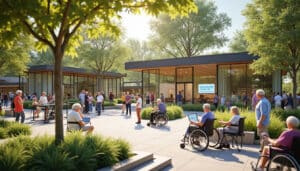The world of real estate is constantly evolving, and Singapore property developers are no exception. Faced with a silver economy booming in China, these sector experts are beginning to adapt their strategies to take advantage of the opportunities offered by this changing market. With an aging population and growing purchasing power among seniors, the growth of this economic segment promises to redefine real estate dynamics in the region. It is therefore with an ambitious vision that these promoters are embarking on this new path, ready to take on the challenges and capitalize on the untapped potential of the Chinese economy.
The world is changing at lightning speed, and the global economy, more than ever, is adapting to demographic changes and the needs of aging populations. The real estate developers of Singapore are beginning to take a close interest in the growth ofsilver economy in China, a unique opportunity that could redefine investment strategies. As the elderly population continues to increase, the need for adapted housing and specific infrastructure is becoming more and more pressing. This phenomenon paves the way for bold initiatives and significant investments in the real estate sector.
The transition to the silver economy
China, with its aging population and low birth rate, presents a challenge but also a opportunity unrivaled for real estate investors. The statistics are enlightening: by 2050, a fifth of the Chinese population will be over 65 years old. Faced with this reality, real estate developers in Singapore are re-evaluating their traditional approaches and looking into projects that meet the needs of seniors. The silver economy market is emerging as a key sector, propelling initiatives that combine housing and services adapted to this age group.
The implications for real estate developers
Singapore property developers are tapping into this growing market by developing projects integrating services health, leisure and community life. Design models must take into account accessibility, safety and comfort for seniors, making design and innovation crucial elements of their success. By collaborating with construction companies and healthcare institutions, these developers aim to create ecosystems where older adults can lead active and fulfilling lives.
A response to the real estate crisis in China
As China’s real estate sector suffers major shocks, companies like Kaisa struggle to navigate a crisis market serve as a warning for those who invest without taking into account structural changes. However, the transition to the silver economy could offer a way out. By focusing on projects dedicated to seniors, real estate developers are helping to stabilize a volatile market while meeting the urgent needs of the aging population.
Optimistic long-term forecasts
Investing in China’s silver economy is a journey that carries risks, but also considerable potential rewards. Large market players have the opportunity to position themselves as pioneers in this new sector, shaping communities that respond to contemporary challenges. By promoting a inclusive growth, real estate developers not only meet an economic need, but also enrich the quality of life of millions of seniors. The potential is immense, and the race towards the future has already begun.
International cooperation, an essential asset
Faced with these challenges and opportunities, Singapore developers can also rely on partnerships with Chinese players. Strategic agreements can enable the sharing of technologies, resources and expertise, making projects more efficient and sustainable. International collaborations will also provide a competitive advantage, positioning Singapore as a leader insilver economy, in particular through the integration of best investment practices and standards.
To learn more about the thriving senior economy and its implications, check out this article here.

The international real estate landscape is changing, and Singapore property developers are no exception. With a vision focused on the future, they begin to focus on the rise of thesilver economy in China, a sector with high potential which reflects the aging of the population and the growing demand for services adapted to seniors. This strategic turning point offers an unprecedented opportunity to explore new markets, while effectively contributing to the response to contemporary demographic challenges.
Understanding the silver economy in China
L’silver economy refers to all economic activities that meet the needs of older people. In China, this sector is booming, driven by increasing life expectancy and the transition to an increasingly older society. The figures speak for themselves: with a growing number of elderly people, the demand for adapted residences, healthcare and leisure activities for seniors is constantly increasing. Singapore property developers can capitalize on this dynamic by developing targeted projects that align with these needs.
Identify market opportunities
For promoters, it is crucial toidentify market opportunities which result from this demographic evolution in China. This involves not only analyzing booming neighborhoods, but also understanding the preferences and expectations of senior consumers. The development of suitable residential communities, which include leisure and healthcare infrastructure, could quickly attract a targeted audience.
Investing in innovation and sustainability
Another strong point of the new real estate projects must be theinnovation and the sustainability. As part of the silver economy, developers can integrate modern technologies that make daily life easier for seniors, such as home automation systems or remote health services. Additionally, by using eco-friendly materials and sustainable practices, they will not only help preserve the environment, but also meet investors’ growing demands for social responsibility.
Establish local partnerships
Finally, to maximize the chances of success in the Chinese market, Singapore property developers should considerestablish local partnerships. Collaborating with local businesses and institutions can help better understand Chinese business culture and consumer expectations. In addition, these partnerships can offer advantages in terms of networks, market knowledge and risk sharing associated with large-scale projects.
In a constantly changing world, real estate developers of Singapore are exploring new opportunities in the face of current economic challenges. The rise ofsilver economy in China, characterized by a growing elderly population and specific needs, appears to be a promising strategic avenue. This article explores recommendations for real estate players in Singapore wishing to embark on this dynamic.
Understanding the silver economy in China
Before entering into this market, it is essential to understand what thesilver economy in China. Rising life expectancy, combined with a declining birth rate, has led to a concentration of older people in society. This phenomenon creates a growing need for adapted services, such as adapted housing, health care and leisure infrastructure. Understanding this context will allow developers to design projects that truly meet the expectations of this clientele.
Invest in suitable housing
One of the main recommendations for real estate developers concerns the development of adapted housing. This involves designing spaces that meet the specific needs of older people: accessibility, safety and comfort. Buildings with on-site healthcare services, accessible transportation and recreational areas can not only appeal to buyers, but also foster intergenerational communities.
Create partnerships with the health sector
Collaborations with the health sector can strengthen the attractiveness of real estate projects. By integrating health services directly into residential complexes, developers can provide peace of mind to future residents and their families. In addition, these partnerships can include preventive care and health education programs, thus positioning promoters as actors committed to the well-being of seniors.
Focus on sustainability
The rise of the ecological sensitivity among the population, including seniors, also opens up prospects. Developers should incorporate sustainable building practices, such as eco-friendly materials and energy-efficient techniques. Sustainability-focused real estate projects not only attract an environmentally conscious clientele, but they can also benefit from government subsidies and tax incentives.
Harness modern technologies
The integration of modern technologies in senior housing is another key recommendation. Security features, home automation systems and digital platforms to manage social interactions and access to services can make all the difference. These technologies can improve the quality of life of residents while making establishment management easier for developers.
Be open to different cultures and lifestyles
The Chinese market is large and diverse. By taking into account cultural differences and varied expectations among the elderly population, developers can adapt their offers. Designing projects that respect and integrate these cultural diversities will not only reach a larger audience, but also build strong and inclusive communities.
By focusing on thesilver economy in China, Singapore real estate developers have many avenues to establish themselves in this market. Through thoughtful strategies geared toward the well-being of seniors, they can create significant impact while ensuring their own growth in these evolving sectors.











